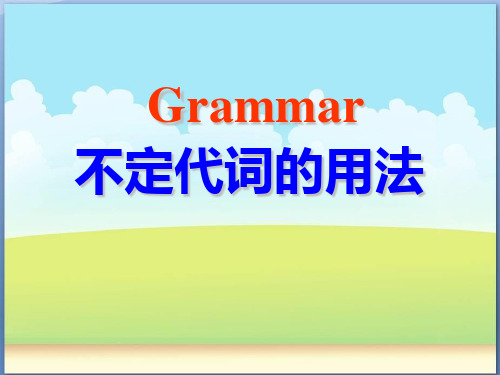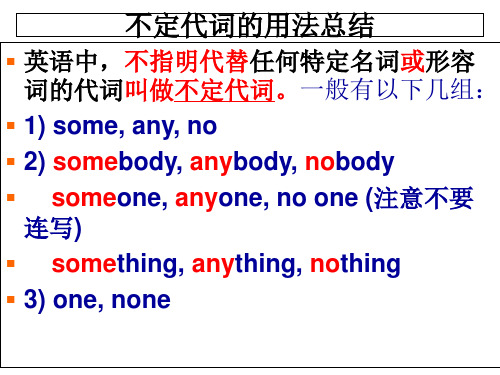初三-不定代词的用法总结-修正版PPT课件
合集下载
不定代词(常见普通不定代词)ppt课件

练习题及答案解析
01
02
答案
解析
C
形容词修饰不定代词时应后置,先排除B、D;anything一般用于疑
问句及否定句,something用于肯定句,也可用于表示请求、建议等
含义的疑问句中。本句是一个表示建议的疑问句,用something。
练习题及答案解析
练习题二:改错 ( ) 1. I have two children, and ________ of them are studying at college.
02
常见普通不定代词介绍
some与any
some
通常用于肯定句,表示“一些、某个” 。
例句
I have some books.(我有一些书。 )
any
通常用于否定句和疑问句,表示“任何 、一些”。
例句
Do you have any questions?(你有 任何问题吗?)
each与every
不定代词(常见普通不定代词 )ppt课件
目录
• 不定代词概述 • 常见普通不定代词介绍 • 不定代词用法详解 • 不定代词与其他词类的搭配 • 不定代词在句子中的位置及功能 • 总结与练习
01
不定代词概述
定义与分类
定义
不定代词是指不特定指代任何特定名词或名词词组的代词,其指代对象不确定 或不具体。
位于句尾
在某些情况下,不定代词可以位于句尾,作为句子的同位语或补语等, 例如,“They went to the party, everyone except me.”(除了我 以外,他们都去参加聚会了。)
在句子中的功能
充当主语
不定代词可以作为句子的主语,表示泛指的人或事物,例 如,“Everyone is entitled to their own opinion.”( 每个人都有权有自己的见解。)
初中英语不定代词精讲课件

5. I can’t understandmuch _______of his speaking
much 6. I like milk, so I drink ______every day. 7.John want to join the music club very much _____.
总结every,each的用法
either
Either
.总结both和all 的用法
1.both “两者都 “ all “三者都“
2. both+名词复数 both of 代词宾格复数 both of + the+名词复数 3. all + the+ 名词复数 all of +代词宾格复数
不可数名词 all of + the+名词复数 4. all 和 both 也可作副词,放在系动词后,行为动词前 例如: The twins both work hard. The four girls are all kind.
习惯搭配: one ….the other some …..others …….
六. 用another和other、others
others 1 Lei Feng is always ready to help ________.
2 Some are planting trees, some are carrying water, others are watering the trees . and _________ 3.I have got ten pencils. Two of them are red , the others are blue. _______ 4 She held a pen in one hand and his notebook in the ________. other others another 5 I have read three stories. I’ll go on to read _____.
中考英语不定代词课件(共29张PPT)

both…and… 作主语时,谓语动词用复数形式. either …or… “不是……就是; 或者……或者”. neither…nor… “既不…又不…
连接的并列结构作主语时, 谓语坚持就近原则
Both Li Ping and I _a_re__ (be) students. Neither Li Ping nor I _a_m__ (be) a student. Either this answer or that answer _i_s__ (be) correct.
There’s only __a_l_itt_le___ meat in the fridge. Please go and buy some.
Just _a_f_e_w__ students came to the party. Most of them stayed at home and watched TV.
3. some of +代词宾格复数 + the + 名词复数
I know some of them, but not all.
4. no+可数名词/不可数名词
no=not a/not any
I have no car. ( I don’t have a car.) We had no bread for breakfast. (We had not any bread for breakfast.)
A. few
B. a few
C. little
D. a little
2. There is little water in the bottle, __is_ _th_e_r_e___? (补全反意疑问句)
.复合不定代词
不定代词精品PPT课件

2024/1/24
10
修饰形容词或副词
常见的修饰形容词或副词的不定代词有
a little, much, many, few, little等。
例子
I have a little money left.(a little修饰money,表示“一点点钱”)
2024/1/24
11
表示数量或程度
常见的表示数量或程度的不定代词有
注重语境理解
在阅读和写作时,注意上下文语境,确保不定代词的正确使用。
遵循语法规则
严格遵守英语语法规则,避免在使用不定代词时出现语法错误。
22
05 练习题库及答案解析
2024/1/24
23
选择题
选择正确的不定代词 填空
根据句子语境选择恰 当的不定代词
2024/1/24
区分不同不定代词的 用法
24
填空题
分类
根据语义和用法,不 定代词可分为以下几 类
泛指代词
如some, any, none 等,用于泛指某人或 某物。
不定数量代词
如few, several, many等,表示数量 上的不确定性。
不定人称代词
如someone, everybody, no one 等,用于指代不特定 的人。
2024/1/24
案例二
探讨句子“I have nothing that belongs to me.”中不定代词 “nothing”与定语从句的关系及用 法。
2024/1/24
17
04 常见错误类型及纠正方 法
2024/1/24
18
误用相似词汇导致混淆
错误示例
将“some”和“any” 混用,导致句子意思不
2024年度不定代词精品精ppt课件

区分不同不定代词的 用法和含义
30
填空题练习
根据句子意思和语法规则,填写正确的不定代词
注意不定代词的数和格的变化
2024/3/23
掌握常见不定代词的固定搭配和用法
31
翻译题练习
将中文句子翻译成英文,正确使用不 定代词
注意英语表达中的语言习惯和语法规 则
2024/3/23
理解中文原句的意思和语境,选择恰 当的不定代词表达
6
常用不定代词
neither
两者都不。用于否定句 中,表示两个人或物都 不具有某种性质或特征 。
either
两者之一。用于肯定句 中,表示两个人或物中 的任意一个。
one
一个。用于可数名词前 ,表示数量上的单一概 念。
another
另一个。用于三者或三 者以上的情况中,表示 除已知的一个之外的另 一个。
other
泛指“其他的”,常与可数名词复数连用。
例子
I don't like this book, show me some others. (我不喜 欢这本书,给我看看其他的。)
another
泛指“另一个”,常用于三者或三者以上的情况。
2024/3/23
例子
This shirt is too small, I want to try another one. (这 件衬衫太小了,我想试试另一件。)
当不定代词被else修饰时,else应放在不定代词之后,如:anything else(别的 东西)。
2024/3/23
27
不定代词的否定形式
not...any
表示“没有任何”,如:not any books(没有任何书)。
不定代词用法详解ppt课件

• Only a few people can solve this problem. 只有几个人能解决这个问题。
• Few of them want to go. 他们中几乎没有人想去。
• A few of them want to go. 他们中有几个人想去。
• (2) little“没有多少”,a little“少量”,修饰不可数名词;a little表示肯定意义, little表示否定意义。
9
• 4) everyone, everybody(每个人)和 everything(每样东西,一切事物)。 • She said good-bye to everyone. 她和每个人告别。 • Everybody's business is nobody's business. 事关大家无人管。 • Everything is ready for the experiment. 实验的一切都准备好了。 • This news means everything to us. 这个消息对我们至关重要。
7
• (5) the others表示同类中余下的全部。 • The search party was divided into two groups. Some went to the right, the
others went to the left. 搜寻小组一分为二,一部分人向右,另一部分向左。 • Jenny is cleverer than any of. the others in her class. 珍妮比班上的其他(任何)人
不定代词用法详解
1
• 1. some,any • (1) some多用于肯定句,修饰复数可数名词和不可数名词,作“一些”解。它还可修饰
不定代词的用法 ppt课件

注意:作主语时,both后面的谓语动词用复数。neither, either后 面的谓语动词一般用单数形式。 作定语:
1) Both Zhang Hua's father and mother worker work in a hospital,
but neither one is a doctor. 张华的父母亲在一所医院工作,但都不
一些重要的 不定代词的用法
2020/12/27
1
不定代词有both, either, neither, one,
the other, another, little, few, some, any, each, every, no, none等,从实际应用和理 解出发,重点学习以下几个:
(一) both, either, neither (二) one, another, the other (三) little, a little, few, a few (四) some / any, no / none, each / every,
2. few, a few 用来修饰可数名词,前者表示否定,后者表示肯定。
A few of us speak English well. 我们中有几个人英语讲得很好。
There were few eggs is the fridge, so he went to the supermarket
and bought some. 冰箱里几乎没鸡蛋了,所以他去超市买了一些。
3. few 作主语时,谓语动词仍用复数,例如:
Few men know this, do they?
4. 常用词组有 quite a few (好几个),only a few (只有一个),a very
1) Both Zhang Hua's father and mother worker work in a hospital,
but neither one is a doctor. 张华的父母亲在一所医院工作,但都不
一些重要的 不定代词的用法
2020/12/27
1
不定代词有both, either, neither, one,
the other, another, little, few, some, any, each, every, no, none等,从实际应用和理 解出发,重点学习以下几个:
(一) both, either, neither (二) one, another, the other (三) little, a little, few, a few (四) some / any, no / none, each / every,
2. few, a few 用来修饰可数名词,前者表示否定,后者表示肯定。
A few of us speak English well. 我们中有几个人英语讲得很好。
There were few eggs is the fridge, so he went to the supermarket
and bought some. 冰箱里几乎没鸡蛋了,所以他去超市买了一些。
3. few 作主语时,谓语动词仍用复数,例如:
Few men know this, do they?
4. 常用词组有 quite a few (好几个),only a few (只有一个),a very
初中英语-不定代词的用法总(共31张PPT)

不定代词的用法总结
▪ 英语中,不指明代替任何特定名词或形容 词的代词叫做不定代词。一般有以下几组:
▪ 1) some, any, no
▪ 2) somebody, anybody, nobody ▪ someone, anyone, no one (注意Байду номын сангаас要
连写)
▪ something, anything, nothing
▪ I could not answer some of his questions.
▪ 我不能回答他的某些问题。
▪ some用在否定句中表示“一些;部分”。如 果说成:
▪ I could not answer any of his questions. ▪ 意思就变了,它表示“我不能回答他的任何问
▪ There are no letters for you today. ▪ 今天没有你的信。
▪ I have no money at the moment. Could you lend me some (money)?
▪ 我现在没有钱。你能借我一些吗?
▪ 二、 复合不定代词的用法
▪ 1. 不定代词some, any, no与-one, -body, thing可以组成九个复合代词。它们是:
▪ Everyone will be here except Patrick.
▪ (everyone 指人)
▪ Every one of the children will get a gift.
▪ (every one也指人)
▪ We played several matches against the visitors, but unluckily lost every one.
▪ 英语中,不指明代替任何特定名词或形容 词的代词叫做不定代词。一般有以下几组:
▪ 1) some, any, no
▪ 2) somebody, anybody, nobody ▪ someone, anyone, no one (注意Байду номын сангаас要
连写)
▪ something, anything, nothing
▪ I could not answer some of his questions.
▪ 我不能回答他的某些问题。
▪ some用在否定句中表示“一些;部分”。如 果说成:
▪ I could not answer any of his questions. ▪ 意思就变了,它表示“我不能回答他的任何问
▪ There are no letters for you today. ▪ 今天没有你的信。
▪ I have no money at the moment. Could you lend me some (money)?
▪ 我现在没有钱。你能借我一些吗?
▪ 二、 复合不定代词的用法
▪ 1. 不定代词some, any, no与-one, -body, thing可以组成九个复合代词。它们是:
▪ Everyone will be here except Patrick.
▪ (everyone 指人)
▪ Every one of the children will get a gift.
▪ (every one也指人)
▪ We played several matches against the visitors, but unluckily lost every one.
- 1、下载文档前请自行甄别文档内容的完整性,平台不提供额外的编辑、内容补充、找答案等附加服务。
- 2、"仅部分预览"的文档,不可在线预览部分如存在完整性等问题,可反馈申请退款(可完整预览的文档不适用该条件!)。
- 3、如文档侵犯您的权益,请联系客服反馈,我们会尽快为您处理(人工客服工作时间:9:00-18:30)。
both; all
none 没有一个 one other 其它的
.
3
(2)普通不定代词的用法
★ some与any
• 一般说来,some 用于肯定句中,any 用于否定句、疑问句和条件句中。如: • ①肯定句:He asked some questions. 他问了一些问题。 • ②否定句:He didn’t ask any questions. 他没有问任何问题。 • ③疑问句:Did he ask any questions? 他问了些问题没有? • 但是,在表示请求、邀请或征求意见的句子中,希望对方的肯定回答,通常要用 some 而
• There is only a little milk in the glass. • He has few friends. • They had little money with them. • 2)a little和little也可以用作副词,a little表示“有点,稍微”,
little表示“很少”。 • I'm a little hungry. (修饰形容词hungry) • Let him sleep a little. (修饰动词sleep) • Mary, go a little faster, please. (修饰副词比较级) • She slept very little last night.
.
4
• ★ many与much
• 两者意思相同,都表示“许多”,但用法不同,many用于修饰或代替可数名 词;而much用于修饰或代替不可数名词。如:
• ① Many trees fell in the storm. 在暴风雨中许多树倒了。 • ② Much money has been wasted that way. 很多钱都这样浪费了。
不定代词的用法总结
.
1
定义:
所谓“不定”,就是“不确定”“不明确”的意思, 所以不定代词就是指不明确表示代替某特定 名词或形容词的代词;
分类:
(1)普通不定代词
(2)复合不定代词
.
2
(1)普通不定代词
some; any many; much each; every
few; little
either两者中的一个 neither两者都不
另一个(男孩)
特定
the other 另一个
the others the other
其余那些人、 (boy)
物
另一个男孩
the other (boys) 其余那些男孩
.
5
every与each的区别
each
every
1)可单独使用
1)不可单独使用
2)可做代名词、形容词
2)仅作形容词
3)着重“个别”
3)着重“全体”,毫无例外
4)用于两者或两者以上中的每一 4)用于三者或三者以上每一个人
个人或物
或物
.
6
There are trees on each side of the street. 在河流的两旁都有树。 Every student passed the exam. 所有学生都通过了考试。 Each of us wears a red coat. 我们每个人都穿着红外套 • The teacher gave a toy to each child. • Each ball has a different color. • 当我们说each child, each student或each teacher时,我们想到的是一个人的情况。
• 你坐公车去还是坐轿车去?一个都不坐,我坐火车去。
.
11
★other, the other, another, others, the others的区别
用法 不定
代名词
形容词
单数
复数
单数
复数
another另一 others别人, another
个
其他人
(boy)
other (boys) 其他男孩
不用any。如: • ① Shall I get some for you? 要我帮你拿些来吗? • ② Since you have plenty of them, why not give her some? • 既然你有那么多,为什么不给她一些呢? • any 有时也用于肯定句中,表示“任何”的意思。如: • Any of these may suit you. 这些中间的任何一个都可能适合你。
.
10
• ★ either与neither • either意思是“两个中间的任何一个”;neither意思是“两个都不”。 • ① He wrote to either of them. 他给他们中的一个人写了信.
• ② --Will you go there by bus or by car? –Neith而当我们说every child和every student时,我们想到的是全体的情况,every的意思 与all接近,表示他们都如此。 • Every student loves the English teacher. = All students love the English teacher. • Every child likes playing. = All children like playing.
.
9
• ★ all与both • all指三者或三者以上的人或物,既可代替或修饰可数名词也可代替
和修饰不可数名词。
• both指两个人或物,用来代替或修饰可数名词。 • ① Both of my parents like sports. 我的父母都喜欢运动。
• ② All of us should work hard.我们都应努力工作.
.
7
★ few, a few, little, a little在用法上的区别
含义
用法 用于可数名词
表示肯定
表示否定
a few虽少,但有几 few不多,几乎没有 个
用于不可数名词 a little,虽少,但有 little不多,没有什么 一点
.
8
• I'm going to buy a few apples. • He can speak only a little Chinese.
none 没有一个 one other 其它的
.
3
(2)普通不定代词的用法
★ some与any
• 一般说来,some 用于肯定句中,any 用于否定句、疑问句和条件句中。如: • ①肯定句:He asked some questions. 他问了一些问题。 • ②否定句:He didn’t ask any questions. 他没有问任何问题。 • ③疑问句:Did he ask any questions? 他问了些问题没有? • 但是,在表示请求、邀请或征求意见的句子中,希望对方的肯定回答,通常要用 some 而
• There is only a little milk in the glass. • He has few friends. • They had little money with them. • 2)a little和little也可以用作副词,a little表示“有点,稍微”,
little表示“很少”。 • I'm a little hungry. (修饰形容词hungry) • Let him sleep a little. (修饰动词sleep) • Mary, go a little faster, please. (修饰副词比较级) • She slept very little last night.
.
4
• ★ many与much
• 两者意思相同,都表示“许多”,但用法不同,many用于修饰或代替可数名 词;而much用于修饰或代替不可数名词。如:
• ① Many trees fell in the storm. 在暴风雨中许多树倒了。 • ② Much money has been wasted that way. 很多钱都这样浪费了。
不定代词的用法总结
.
1
定义:
所谓“不定”,就是“不确定”“不明确”的意思, 所以不定代词就是指不明确表示代替某特定 名词或形容词的代词;
分类:
(1)普通不定代词
(2)复合不定代词
.
2
(1)普通不定代词
some; any many; much each; every
few; little
either两者中的一个 neither两者都不
另一个(男孩)
特定
the other 另一个
the others the other
其余那些人、 (boy)
物
另一个男孩
the other (boys) 其余那些男孩
.
5
every与each的区别
each
every
1)可单独使用
1)不可单独使用
2)可做代名词、形容词
2)仅作形容词
3)着重“个别”
3)着重“全体”,毫无例外
4)用于两者或两者以上中的每一 4)用于三者或三者以上每一个人
个人或物
或物
.
6
There are trees on each side of the street. 在河流的两旁都有树。 Every student passed the exam. 所有学生都通过了考试。 Each of us wears a red coat. 我们每个人都穿着红外套 • The teacher gave a toy to each child. • Each ball has a different color. • 当我们说each child, each student或each teacher时,我们想到的是一个人的情况。
• 你坐公车去还是坐轿车去?一个都不坐,我坐火车去。
.
11
★other, the other, another, others, the others的区别
用法 不定
代名词
形容词
单数
复数
单数
复数
another另一 others别人, another
个
其他人
(boy)
other (boys) 其他男孩
不用any。如: • ① Shall I get some for you? 要我帮你拿些来吗? • ② Since you have plenty of them, why not give her some? • 既然你有那么多,为什么不给她一些呢? • any 有时也用于肯定句中,表示“任何”的意思。如: • Any of these may suit you. 这些中间的任何一个都可能适合你。
.
10
• ★ either与neither • either意思是“两个中间的任何一个”;neither意思是“两个都不”。 • ① He wrote to either of them. 他给他们中的一个人写了信.
• ② --Will you go there by bus or by car? –Neith而当我们说every child和every student时,我们想到的是全体的情况,every的意思 与all接近,表示他们都如此。 • Every student loves the English teacher. = All students love the English teacher. • Every child likes playing. = All children like playing.
.
9
• ★ all与both • all指三者或三者以上的人或物,既可代替或修饰可数名词也可代替
和修饰不可数名词。
• both指两个人或物,用来代替或修饰可数名词。 • ① Both of my parents like sports. 我的父母都喜欢运动。
• ② All of us should work hard.我们都应努力工作.
.
7
★ few, a few, little, a little在用法上的区别
含义
用法 用于可数名词
表示肯定
表示否定
a few虽少,但有几 few不多,几乎没有 个
用于不可数名词 a little,虽少,但有 little不多,没有什么 一点
.
8
• I'm going to buy a few apples. • He can speak only a little Chinese.
